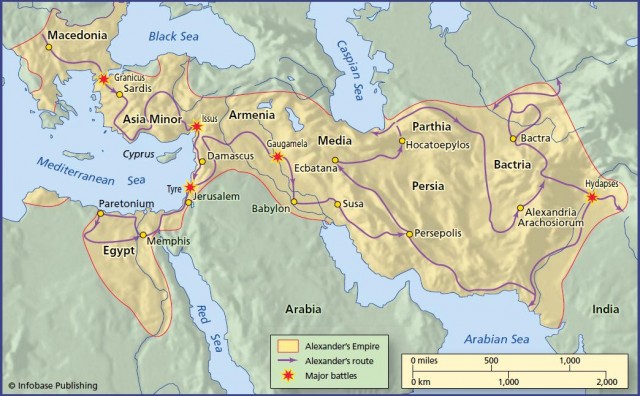Alexander the Great and His Empire
Aristotle taught Alexander (356–323 b.c.e.) before the prince inherited the throne of Macedon in 336 b.c.e. and began to extend the empire his father had won by conquest. Later, the garden at the Lyceum in Athens came to contain plants contributed by followers of Alexander's armies. Theophrastus based many of his plant descriptions on accounts he obtained from travelers who had visited distant regions of Alexander's empire. The library at Alexandria, which Dioscorides probably used, opened during the reign of Alexander's general Ptolemy I Soter (ca. 367 b.c.e.–ca. 283 b.c.e.). Ptolemy I was a close personal friend of Alexander and may have been a fellow student taught by Aristotle. He became ruler of Egypt in 323 b.c.e. following Alexander's death. The actual work of planning and supervising the library was delegated to Demetrius of Phaleron (ca. 350–ca. 280 b.c.e.), a Lyceum student of Theophrastus.
Alexander ruled Macedon as regent from 340 b.c.e., while his father, Philip II, led a large Macedonian army that invaded Thrace, the country bordering Macedon in the east. Later, Alexander quarreled with Philip and left Macedon, but in 336 b.c.e. Philip was assassinated and Alexander, aged 20, became Alexander III of Macedon, later called Alexander the Great. As the news of Philip's death spread, people in the countries conquered by the Macedonians saw a chance to seize their freedom, and Alexander had to act. He began by executing all his opponents inside Macedon, then restored Macedonian rule in Greece, Thrace, and Illyria.
Leaving an experienced general Antipater (ca. 398–319 b.c.e.) to maintain order at home, in 334 b.c.e. Alexander led a large force into Asia Minor as the first stage of his imperial expansion. The Macedonians defeated a large Persian army, secured the coast of Asia Minor, and in 333 b.c.e. they fought and defeated another Persian army, this one led by the Persian king Darius III. Alexander's forces then fought their way southward through Syria and Phoenicia. In the spring of 331 b.c.e. the Macedonians entered Egypt. After a few months they returned to Tyre, where they received reinforcements from Europe and headed eastward. They defeated the Persians once more at Gaugemala, to the east of the Tigris River, occupied Babylon, and then captured Susa and the Persian capital, Persepolis, and Alexander was proclaimed king of Asia. The Macedonians then resumed their pursuit of Darius, whom they found dying from wounds inflicted by one of his own noblemen—who was later captured by the Macedonians and punished by Alexander's orders. Pressing eastward into central Asia, they reached the Tian Shan Mountains in western China, where a statuette of a Greek soldier has been found in a burial site.

In 326 b.c.e. Alexander invited the chieftains from what is now northern Pakistan to submit to his rule. Some agreed, but others opposed the Macedonians and were overcome only after intense fighting in which Alexander was wounded. The Macedonian soldiers, who longed to see their homes and families, opposed Alexander's plan to press farther into India and persuaded him to turn back. They reached Babylon, where Alexander died on June 11, 323 b.c.e., in the palace of Nebuchadrezzar II. Historians are uncertain of the cause of his death, but it is most likely to have been from disease. In one more month Alexander would have been 33 years old. As the following map shows, at its peak his empire extended from Macedon in the west to the Indus Valley in the east, and from the southern shores of the Black and Caspian Seas to Egypt. The empire began to disintegrate within a few years of Alexander's death, breaking into many independent kingdoms.
Alexander had been a student of Aristotle's, and although the young man's education was interrupted he was highly intelligent and Aristotle had exerted a strong influence on his development. Aristotle encouraged all his students to observe and investigate the natural world, and Alexander was keenly interested in plants and animals. A large retinue of scholars accompanied him as he led his armies. They measured distances, prepared maps, studied unfamiliar religions, and also the flora and fauna. When they came across unfamiliar plant or animal species, Alexander would send specimens back to Europe, many of them to the Lyceum in Athens, for the attention of Aristotle himself. He gathered what information he could on local herbal treatments and practiced medicine, personally treating some of the injuries and diseases afflicting his soldiers.
In 332 b.c.e. Alexander founded the city of Alexandria on the site of Rhakotis, an Egyptian fishing port. He intended the city to bridge the cultures of Greece and Egypt, but he remained there for only a few months after construction began, and he never returned. After Alexander's death, Ptolemy I managed to have his body brought to the city. The library at Alexandria was built as a replica of the Lyceum, with a colonnaded walk and gardens. There were lecture theaters, reading rooms, and a communal dining room, and the library was located next to, and in the service of, the Musaeum, which was a temple used as an academic institution—and the origin of the word museum. The managers of the library were instructed to collect all the information in the world. Library representatives attended book fairs in Athens and Rhodes, and whenever a ship arrived in the port any books it carried would be seized and copied, the library retaining the originals and returning the copies to the shipmaster. This is the library where Pedanius Dioscorides may have studied. Much of the library was accidentally burned down in 48 b.c.e. during a civil war, and although a branch of the library, known as the daughter library, continued to function to the south of the city, it too was destroyed in 391 c.e. when the Roman emperor Theodosius I (347–395) ordered the destruction of all pagan temples.